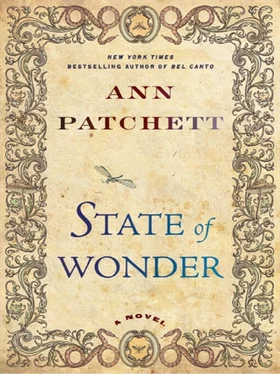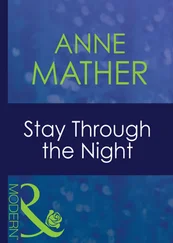Dr. Swenson glanced up for a moment as if surprised to see Marina was still there. “Of course, when I was younger. It seemed fascinating at the time, as if we had discovered something central to the identity of the people. It was very important to Dr. Rapp, it was important to the entire field of mycology. I picture all those students now, boys from Park Avenue and Hyde Park and Back Bay who had spent their previous summers in the Hamptons scooping ice cream, all marching off into the jungle ready to ingest anything that was given to them. The way they opened their mouths and closed their eyes you would have thought the Lakashi were distributing communion. Actually, the ceremony would have made a striking program for interdisciplinary studies — biology, anthropology, world religion. I certainly found it compelling as a medical student to see how long a person could sustain such a low heart rate. In the whole lot of them there wasn’t a pulse over twenty-four. I once brought a cuff with me and monitored the Lakashi and the students every twenty minutes for five hours after they had reached a state of unconsciousness. Their diastolic pressure ticked in slightly above dead. I was only testing for my own interest but if I could have put together a committed control group it could have been an important study over time.”
“Did you—” Marina wasn’t exactly sure how to phrase the question.
“I did, of course, but mycology was never my field. I was more interested in recording the subjects. Let the botanist take notes on his own trip, I say. I was of great assistance to Dr. Rapp in this way. He never had a graduate student who was willing to abstain for purposes of observation. I didn’t mind that, of course, I was glad to help the science. The real problem was the Lakashi themselves. Once the women realized I wasn’t going on the trip anymore they started piling all the babies around me, all the children. I put a quick stop to that.”
“The children were participating?”
“I suppose that conflicts with your ideas of good parenting. In retrospect, I can see how you would have preferred me to stop them, but I didn’t know you at the time.”
“That’s fine. I’m not interested in the children,” Marina said, and in fact she was telling the truth. From what she could tell, the Lakashi children were constructed out of titanium. They ate random berries and were bitten by spiders and fell out of trees and swam with piranha and they were fine. She could hardly see how a regular dosing of hallucinogens could make a difference. “But when you did go on the trip, as you say, did you enjoy it?” Marina had given her youth to studying, believing all the propaganda of the dangers of drugs while her worshiped professor was spending her weekends in the Amazon eating mushrooms. She felt she deserved to know at least secondhand if it had been any fun.
Dr. Swenson took off her reading glasses and pressed her fingertips hard against the bridge of her nose. “I keep hoping that you are more than you show yourself to be, Dr. Singh. I am just on the verge of liking you but you dwell on the most mundane points. Yes, of course it was interesting to take part in the ritual, that was what we had come here to do. It was slightly terrifying the first time, all of the screaming and the smoke, in that way it was a little like your experience coming up the river at night, except that you are all very close together in one giant, enclosed hut. Seeing God was worthwhile, of course. I doubt seriously that anything in our Western tradition would have shown Him to me so personally. I remember Dr. Rapp would feel quite humbled for several days after the experience and would continue to see a great deal of purple. We all would. But in the final assessment I am a person who loathes vomiting, and there is a great deal of vomiting involved in the Lakashi ritual. It is an unavoidable part of the program. The body isn’t capable of processing that amount of poison without—” Dr. Swenson, who was sitting on a low stool in front of a table she used for her desk, closed her eyes as if she were remembering the experience. She kept her eyes closed for entirely too long.
“Dr. Swenson?”
She held up her hand and shook her head almost imperceptibly, warding off further questions. Then she stood up, looking watery and pale, and, going quickly out the door, vomited next to the front steps.
Dear Jim,
It is true that no one here has a telephone. I believe it has something to do with the humidity, which is the enemy of all machines. While I am told there is an Internet connection in a village several hours west of Manaus (which is nowhere near us anyway) it only works when there have been two entire weeks without rain, which means de facto no connection. The second phone you gave me, along with my second suitcase, disappeared after my arrival in the Lakashi Village. I have been a poor steward of my belongings. It has been so long since I’ve been able to tell you where I am that I worry by now you must think I’m dead. I am hoping the mail service comes through for me and you get this letter quickly. I’ve been here a week and this is my first hope of getting a letter out of the village, though Dr. Nkomo told me that when Anders was here he would stand on the banks of the river with a letter in his hand and watch for any passing dugout canoe. What I most want to say is that you shouldn’t worry about me. Life among the Lakashi has been better than expected. I have a small job in the lab and over time I feel I will be able to discern how much real progress has been made on the drug. While everyone is friendly no one is particularly forthcoming as to what aspects of the research they are responsible for. I will tell you that the pregnancies are astonishing. Ages are difficult to document in the older members of the tribe (Dr. Swenson began to document the children when she first arrived fifty years ago) but there are pregnant women here who seem clearly to be in their seventies. The more I see the more I understand your commitment to this drug, no matter how much time it takes to reach the first human dose.
Marina was at the end of her fold-over sheet and she hesitated at her closing. Love was not a word that had made its way into their parlance and yet she was certain it was implicitly true. She couldn’t see how, given all that had happened, that there would be anything shocking about its introduction here. And so she wrote it in ink, Love, Marina. She followed this letter with very brief notes to her mother and Karen in which she used most of her paper explaining why the note was so short. After all, the boat was leaving soon and she didn’t want to keep anyone waiting. She promised to start longer letters immediately and save them for the next departure.
It was true that Anders had been impatient with the mail system, several people had commented on that. He would take Easter to the river and they would stand for hours waiting for anyone to paddle past, then when finally someone did, he would have the boy swim out with the letter and the money. Dr. Budi said he tried to get a letter in every boat that went by just to increase his chances that one or two might actually find their way home to his wife. But after a while he was too sick to go down to the water himself, too sick to spend so many hours in the sun, and so he sent Easter alone. It did not require a great deal of inquiry on Marina’s part to put this together, nor much conjecture to fill in the missing pieces: Anders, sick, wrote letters to his wife. Easter, worried, did not want to leave Anders for the amount of time it would have taken to find a boat going past. The traffic on their little tributary was thin at best and on some days not a single person floated by. While Easter would have understood the ritual of giving the blue envelope to someone in a boat, he could not have understood what a letter was or what it represented, only that Anders wrote and wrote. He would have only just come back to the sleeping porch and his friend would want to send him out again with another envelope.
Читать дальше












